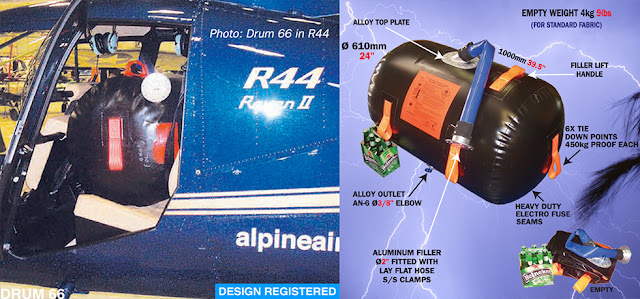Flexible Aircraft Fuel Tanks Can Eliminate Post-Crash Fires
Two years after a horrific helicopter crash left one man dead, and two critically injured, an FAA enquiry has revealed that the post-crash fire could have been avoided by using flexible fuel bladders.
The Federal Aviation Administration launched its investigation after the July 2015 crash of a Flight for Life helicopter, in Frisco, Colorado. The Airbus AS350 burst into flames after impact, killing pilot Patrick Mahany.
Paramedic and flight nurse David Repsher suffered burns to 90% of his body, while flight nurse Matthew Bowe was left with permanent disabilities.
Crash Was Survivable
The investigation revealed that this, and many other helicopter crashes, would be survivable, if fire had not occurred. And the risk of fire could be minimised by changing fuel systems.
Evidence confirmed that the use of flexible aircraft fuel tanks and breakaway valves could 'all but eliminate' fatal post-crash fires.
The technology behind the flexible diesel fuel tanks is not new, but it has been revolutionised by Gold Coast company, Turtle-Pac.
Flexible Tank Solutions
Laszlo Torok launched the company after surviving a sailing disaster during Cyclone Lance in 1984. The incident, aboard the yacht, Hussar, inspired him to invent the world's first yacht flotation system.
From there the company launched a growing range of flexible tank products, including collapsible aircraft ferry tanks, air cargo tanks, and air droppable fuel tanks.
Flexible fuel tanks offer many advantages over traditional rigid tanks, with the main one being safety. Unlike rigid tanks, flexible diesel fuel tanks do not leave an air space, thus avoiding the build up of dangerous vapours. They are also resistant to stress cracks.
Crash Prompts Warning
The potential danger of rigid tanks was highlighted after the 2013 crash of a Robinson R44 helicopter in New South Wales. It wasn't the first fatal crash involving the R44, prompting the Australian Transport Safety Bureau to recommend that all R44 owners replace the rigid tanks with flexible bladder tanks.
The latest findings look set to herald a major change in helicopter fuel systems.
The Federal Aviation Administration launched its investigation after the July 2015 crash of a Flight for Life helicopter, in Frisco, Colorado. The Airbus AS350 burst into flames after impact, killing pilot Patrick Mahany.
Paramedic and flight nurse David Repsher suffered burns to 90% of his body, while flight nurse Matthew Bowe was left with permanent disabilities.
Crash Was Survivable
The investigation revealed that this, and many other helicopter crashes, would be survivable, if fire had not occurred. And the risk of fire could be minimised by changing fuel systems.
Evidence confirmed that the use of flexible aircraft fuel tanks and breakaway valves could 'all but eliminate' fatal post-crash fires.
The technology behind the flexible diesel fuel tanks is not new, but it has been revolutionised by Gold Coast company, Turtle-Pac.
Flexible Tank Solutions
Laszlo Torok launched the company after surviving a sailing disaster during Cyclone Lance in 1984. The incident, aboard the yacht, Hussar, inspired him to invent the world's first yacht flotation system.
From there the company launched a growing range of flexible tank products, including collapsible aircraft ferry tanks, air cargo tanks, and air droppable fuel tanks.
Flexible fuel tanks offer many advantages over traditional rigid tanks, with the main one being safety. Unlike rigid tanks, flexible diesel fuel tanks do not leave an air space, thus avoiding the build up of dangerous vapours. They are also resistant to stress cracks.
Crash Prompts Warning
The potential danger of rigid tanks was highlighted after the 2013 crash of a Robinson R44 helicopter in New South Wales. It wasn't the first fatal crash involving the R44, prompting the Australian Transport Safety Bureau to recommend that all R44 owners replace the rigid tanks with flexible bladder tanks.
The latest findings look set to herald a major change in helicopter fuel systems.


Comments
Post a Comment